Of good family
Aline Mayrisch de Saint-Hubert was born on August 22, 1874 in Hollerich, Luxembourg, as the
daughter of Marie Élisabeth Julie Mongenast and the timber merchant Xavier de Saint-Hubert.
After attending the secondary school "Sainte Sophie" in Luxembourg, she spent two years in Bonn, where she was prepared for marriage and the lifestyle of a lady of the wealthy bourgeoisie at the boarding school "Sartorius". Although she was considered gifted, intelligent and curious, and above all had an interest in art, literature and science, she was not allowed to complete a higher education degree, as access to higher education was denied to women.
Eventually, at the age of twenty, she married the industrialist and businessman Émile Mayrisch, who later became the director of the steel giant Arbed. With her husband, she moved to Dudelange in southern Luxembourg and they had a son in 1899, who died at a young age. Two years later, their daughter Andrée Mayrisch was born.
In 1920, the family moved to Colpach and had their castle in Dudelange converted into a children's home. At last in 1939, Aline Mayrisch moved to the south of France, to the town of Cabris, where she passed away at the age of 72 in 1947.
After attending the secondary school "Sainte Sophie" in Luxembourg, she spent two years in Bonn, where she was prepared for marriage and the lifestyle of a lady of the wealthy bourgeoisie at the boarding school "Sartorius". Although she was considered gifted, intelligent and curious, and above all had an interest in art, literature and science, she was not allowed to complete a higher education degree, as access to higher education was denied to women.
Eventually, at the age of twenty, she married the industrialist and businessman Émile Mayrisch, who later became the director of the steel giant Arbed. With her husband, she moved to Dudelange in southern Luxembourg and they had a son in 1899, who died at a young age. Two years later, their daughter Andrée Mayrisch was born.
In 1920, the family moved to Colpach and had their castle in Dudelange converted into a children's home. At last in 1939, Aline Mayrisch moved to the south of France, to the town of Cabris, where she passed away at the age of 72 in 1947.
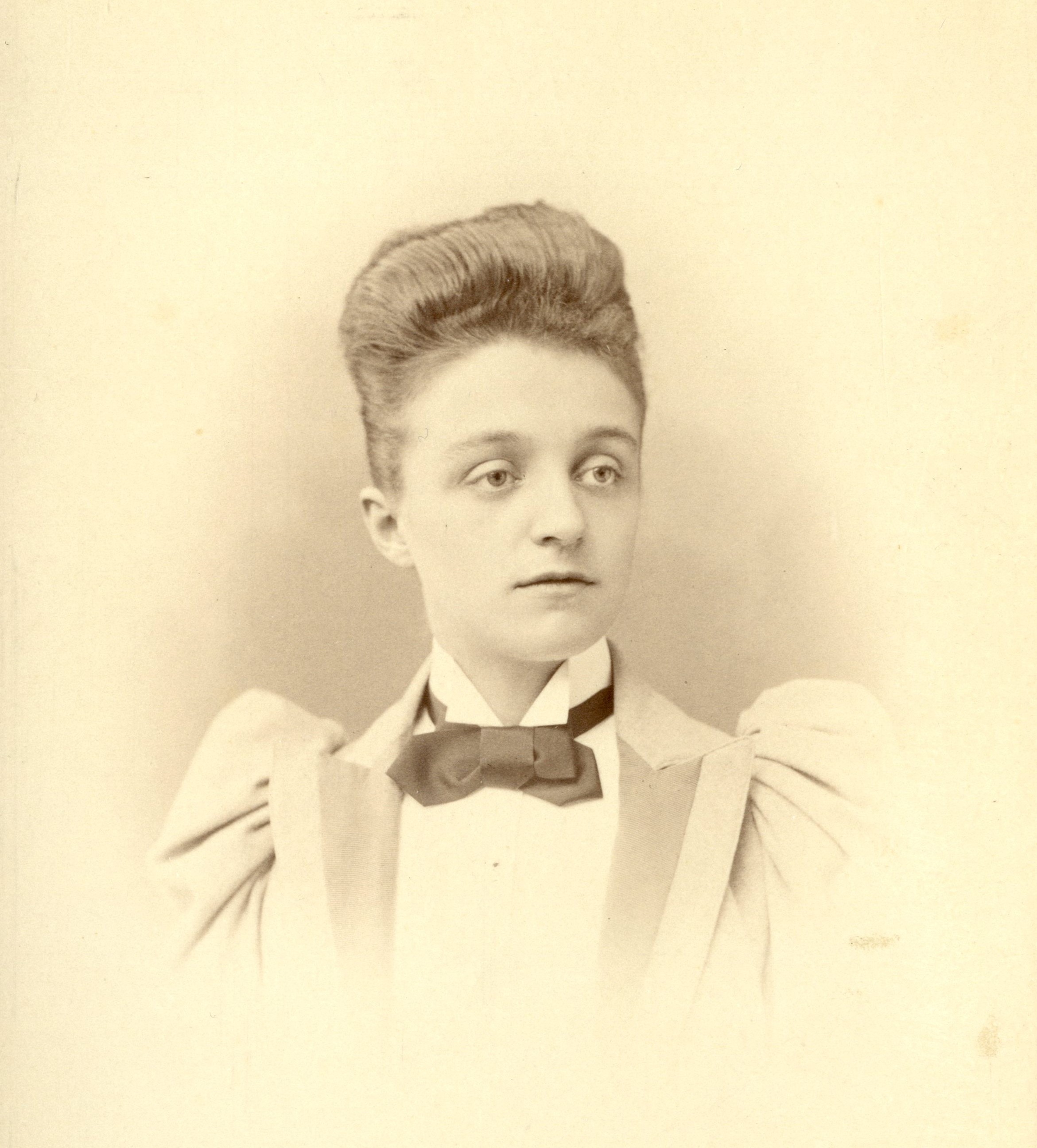
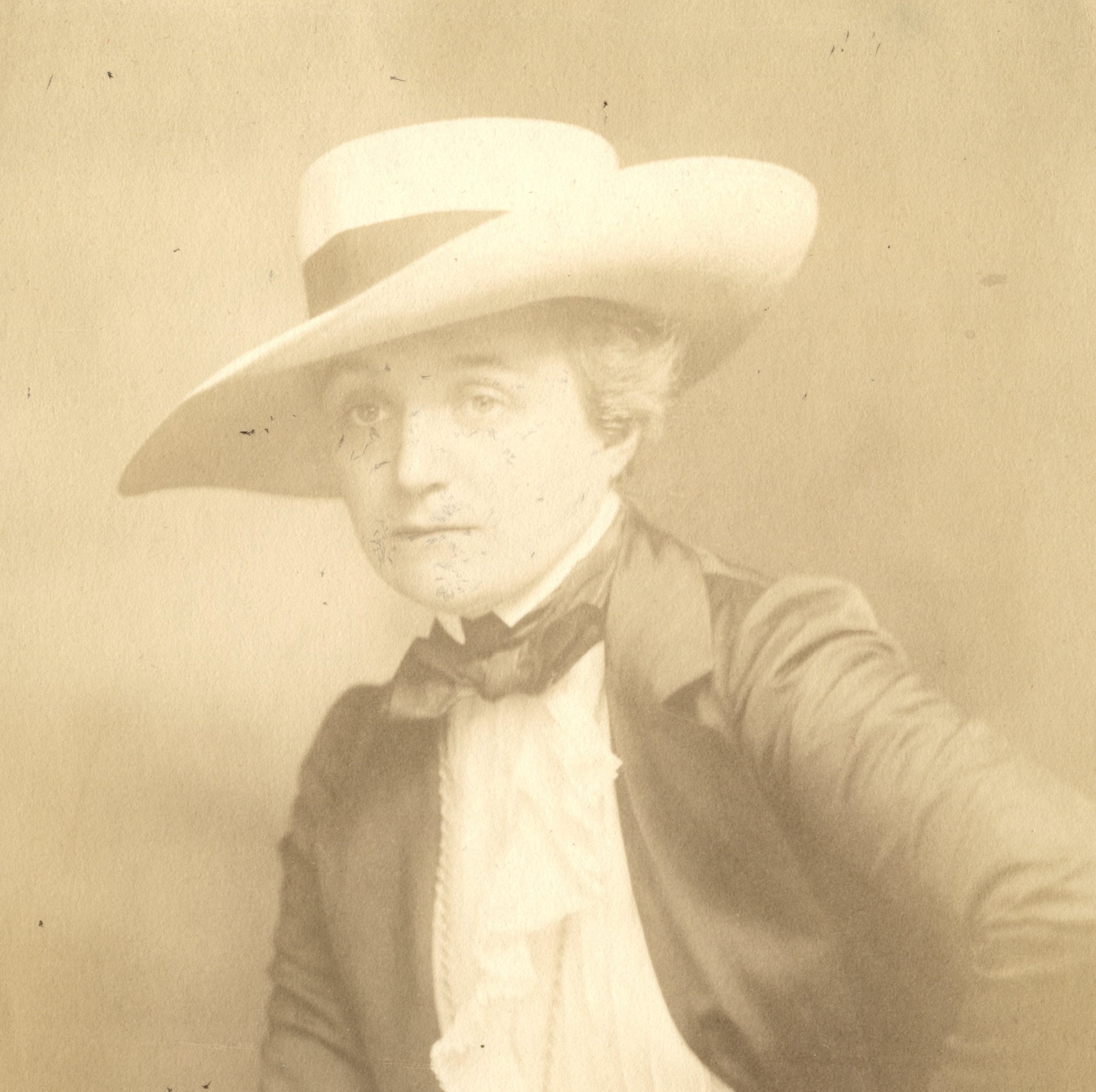
Image 1: Young Aline Mayrisch © J. Ganz, Brussels, 1893, via Luxembourg Dictionary of Authors, All rights reserved
Image 2: Adult Aline Mayrisch © Atelier Hützel, Munich, 1911, via Luxembourg Dictionary of Authors, All rights reserved
Commitment to educational equality
Aline Mayrisch was very involved in the social sector and founded numerous organizations for
various purposes.
Her first organization was founded in 1906 together with other women, and thus the "Association pour les Intérêts de la Femme" (engl. „League for the Defence of the Women's Interests“) was established, which focused on helping women in need and promoting education for girls. In addition, the organization helped finding jobs, legal protection for women and organized numerous further education courses. In Luxembourg, this represented one of the first moments of organized feminism.
In order to advance educational equality in Luxembourg, Aline Mayrisch founded another organization in 1909, which focused on the establishment of a girls' high school. In the same year, the government approved the establishment, but on the condition that within three years they had to prove that a secondary school for girls was indeed necessary. Thus, the "Lycée des Jeunes Filles" was founded in Luxembourg City, which was attended by numerous middle-class girls.
The project was approved despite protests in 1911 when a public financing of girls' schools was voted for without opposition. This made it possible to put an end to the education crisis and allowed women to attend university, enabling them to obtain an education equal to that of men.
Her first organization was founded in 1906 together with other women, and thus the "Association pour les Intérêts de la Femme" (engl. „League for the Defence of the Women's Interests“) was established, which focused on helping women in need and promoting education for girls. In addition, the organization helped finding jobs, legal protection for women and organized numerous further education courses. In Luxembourg, this represented one of the first moments of organized feminism.
In order to advance educational equality in Luxembourg, Aline Mayrisch founded another organization in 1909, which focused on the establishment of a girls' high school. In the same year, the government approved the establishment, but on the condition that within three years they had to prove that a secondary school for girls was indeed necessary. Thus, the "Lycée des Jeunes Filles" was founded in Luxembourg City, which was attended by numerous middle-class girls.
The project was approved despite protests in 1911 when a public financing of girls' schools was voted for without opposition. This made it possible to put an end to the education crisis and allowed women to attend university, enabling them to obtain an education equal to that of men.
Improvement of the health system
Health care and charities were important interests of Aline Mayrisch, which led her to engage with
the "Ligue luxembourgeoise contre la tuberculose" (engl. "Luxembourg League against
Tuberculosis") and to promote the training of social workers. In addition, she supported the
development of the first daycare centre for children in Esch-sur-Alzette, which contributed to an
improvement in the everyday lives of women.
With the outbreak of the First World War, she set up a military hospital in Dudelange, where she
helped care for wounded soldiers from both sides of the war. After the war, she joined the Red
Cross and became increasingly involved in the organization after the sudden accidental death of
her husband, until she was elected president of the Luxembourg Red Cross in 1933. Furthermore,
she supported the creation of a modern maternity hospital and preventive care facilities for babies
and young children in Luxembourg.
For her efforts in the healthcare sector, she received the Cross of Honour, one of the highest honours in Luxembourg, awarded to her by the Grand Duchess Charlotte.
When Aline Mayrisch passed away in 1947, she donated her castle in Colpach as well as a large part of her fortune to the Luxembourg Red Cross, eventually transforming it into a recovery and convalescence centre.
Image: Kolpach Castle, where the "Cercle de Colpach" took place. MMFE, via Wikimedia Commons, CC BY-SA 3.0.
For her efforts in the healthcare sector, she received the Cross of Honour, one of the highest honours in Luxembourg, awarded to her by the Grand Duchess Charlotte.
When Aline Mayrisch passed away in 1947, she donated her castle in Colpach as well as a large part of her fortune to the Luxembourg Red Cross, eventually transforming it into a recovery and convalescence centre.
Image: Kolpach Castle, where the "Cercle de Colpach" took place. MMFE, via Wikimedia Commons, CC BY-SA 3.0.
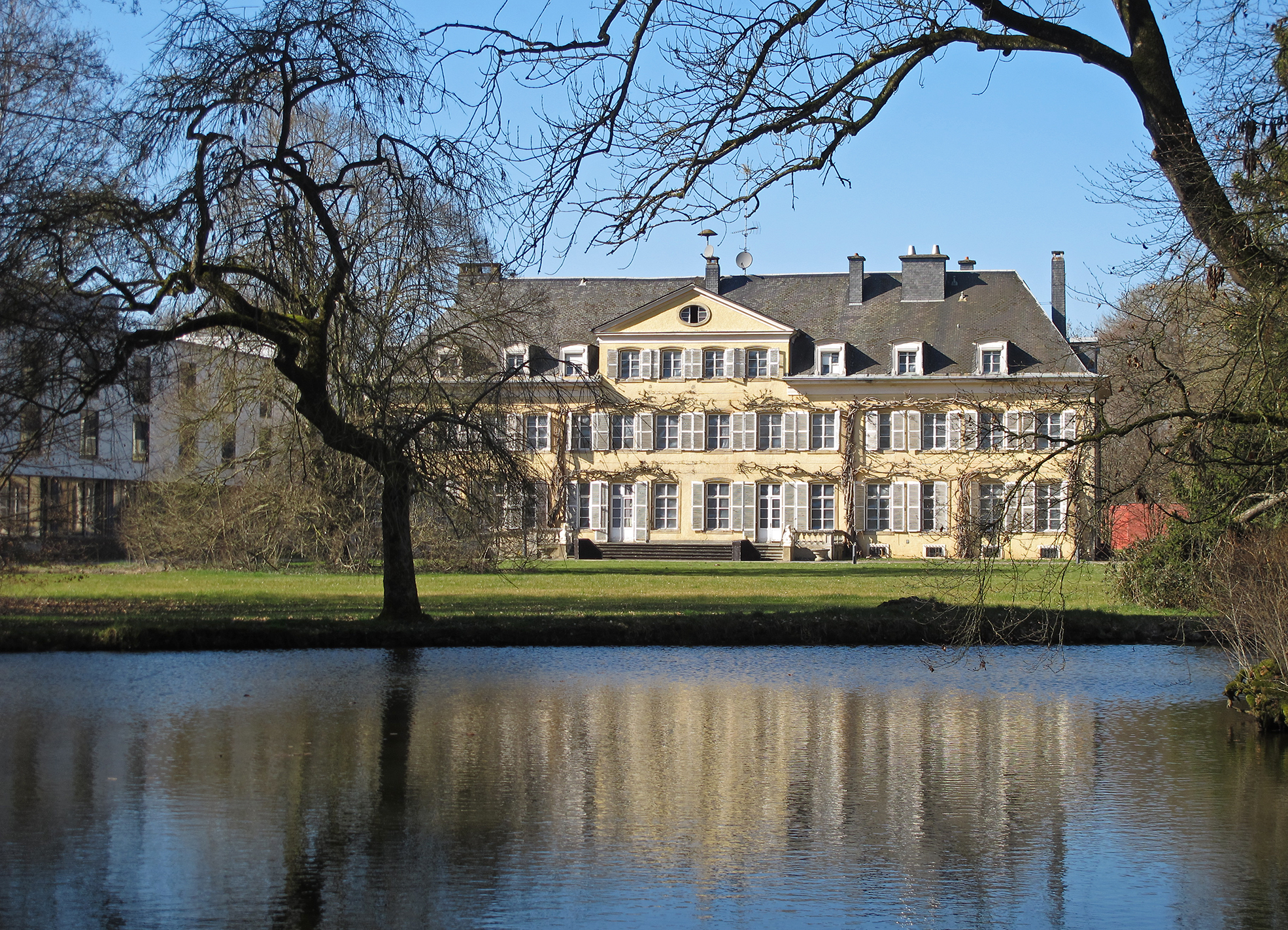
click around to close
„Cercle de Colpach“
Aline Mayrisch was very interested in art and literature and used this to mediate between the
cultural circles of Germany and France. Since the reconciliation of both countries was important to
her and her husband, they invited numerous personalities to their castle in Colpach and thus
founded the "Comité franco-allemand" in 1917. Through this literary circle, a connection was to
be forged between personalities from the different nations in order to build an understanding for
each other.
Especially in the period between the world wars, the meetings increased and intellectuals from politics, business, art and literature came together in the castle. They would exchange their different views and ideas with each other during meetings in the library, in the park or over a meal. Many friendships were formed in the circle, reflecting Aline Mayrisch's idea of a pacifist and united Europe.
After the accidental death of her husband, she began to withdraw and spent the 1930s devoting more time to literature and religious mysticism.
Especially in the period between the world wars, the meetings increased and intellectuals from politics, business, art and literature came together in the castle. They would exchange their different views and ideas with each other during meetings in the library, in the park or over a meal. Many friendships were formed in the circle, reflecting Aline Mayrisch's idea of a pacifist and united Europe.
After the accidental death of her husband, she began to withdraw and spent the 1930s devoting more time to literature and religious mysticism.
Literary interest
From a very young age Aline Mayrisch was interested in cultural as well as political topics, which is
why she began writing reports on German artists as well as book reviews in the Belgian magazine
"L'Art moderne" in 1898. Among her most famous reviews was her article on the work
"L'Immoraliste", which was written by her acquaintance André Gide.
She also maintained friendships with many important writers from France, Luxembourg, Belgium and Germany and corresponded with many of them. While she advocated for uncompromising art with Edmond Picard and Emile Verhaeren, she also provided financial support to Thomas Mann in the 1930s, who published his magazine "Mass und Wert" from exile.
During her trip to Japan in 1934, she sought religious meaning and became increasingly interested in Buddhism. Therefore, in her later life, Mayrisch turned more to religious mysticism and, together with Marie Delcourt and Bernhard Groethuysen, translated various texts, including the sermons of the medieval mystic Master Eckhart.
She also maintained friendships with many important writers from France, Luxembourg, Belgium and Germany and corresponded with many of them. While she advocated for uncompromising art with Edmond Picard and Emile Verhaeren, she also provided financial support to Thomas Mann in the 1930s, who published his magazine "Mass und Wert" from exile.
During her trip to Japan in 1934, she sought religious meaning and became increasingly interested in Buddhism. Therefore, in her later life, Mayrisch turned more to religious mysticism and, together with Marie Delcourt and Bernhard Groethuysen, translated various texts, including the sermons of the medieval mystic Master Eckhart.
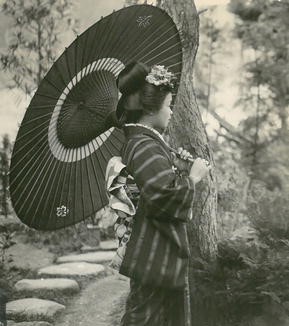
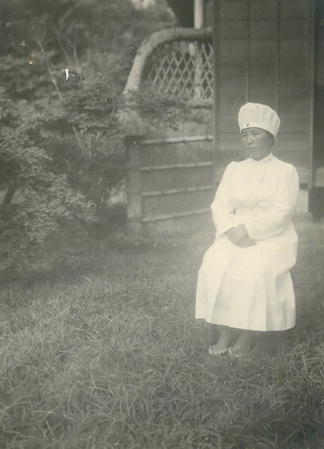
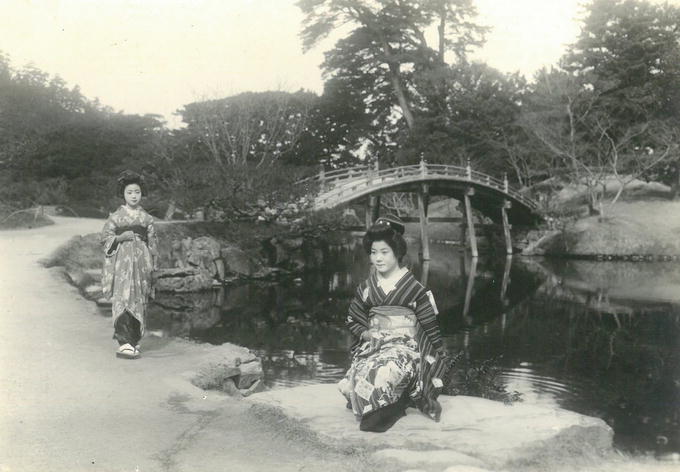
The pictures show photographs and postcards that Aline Mayrisch brought back from her trip to Japan. They show how she appreciated the culture and how the country oscillates between modernity and tradition.
© Centre national de littérature, Luxembourg, CC BY-NC 4.0






